While everyone needs different amounts of vitamins and minerals, women have unique nutrition needs that may be difficult to meet when cutting calories to lose weight. Make sure your eating style includes the following to reduce your risk of falling short of these beneficial nutrients:
Carbohydrates
One problem with low-carb diets is they restrict your body's preferred energy source. If you want to cut back on calories from carbohydrates, focus on reducing your intake of sugar-sweetened beverages, such as soft drinks, as well as candy and other foods with added sugars. To maximize your energy level and long-term health, look to nutrient-rich carbohydrate sources such as whole grains, fruits, vegetables, beans and peas.
Protein
One of the most satisfying ways to balance intake is to include lean protein at every meal. Try low-fat dairy products, lean meats, poultry, seafood, tofu, nuts and beans. If you’re a morning snacker, protein may be especially helpful at breakfast. Including protein at your morning meal may help keep you satisfied until lunchtime and make it easier to avoid snacks that contain saturated fats and added sugars.
Iron
Iron is one of the few nutrients that females between the ages of 14 and 50 need in a higher amount than males who are the same age to reduce their risk of iron-deficiency anemia. This type of anemia can result in fatigue, weakness and irritability and may result in low-birth-weight infants for women who are pregnant.
Pump up your intake with iron sources, such as lean red meat, iron-fortified cereals, poultry, fish and beans. When relying on plant foods for iron, eat a source of vitamin C, such as strawberries or tomatoes, to help your body absorb the iron.
Calcium
Calcium does a lot more than help build strong bones and teeth. Getting enough calcium helps keep your heart and muscles strong and may help reduce the risk of high blood pressure and colon cancer. Enjoy foods, such as low-fat dairy; calcium-set tofu; green leafy vegetables including kale, collard greens and broccoli; and calcium-fortified 100% fruit juice. Aim for at least 1,000 milligrams per day (1,200 milligrams per day if you are 51 or older).
Folic Acid
Every female age 14 and older needs 400 micrograms of folate (or folic acid) every day, unless they are pregnant or breastfeeding, both of which require a higher amount. This vitamin helps keeps red blood cells healthy and is essential in preventing neural tube birth defects. Get your folate from tasty, nutrient-rich foods, such as whole grains, green leafy vegetables, oranges, berries, nuts, and beans or enriched grain products, which have been fortified with folic acid.
Find a Nutrition Expert
Looking for credible nutrition information and recommendations? The Academy of Nutrition and Dietetics' network of credentialed food and nutrition practitioners are ready to help!

